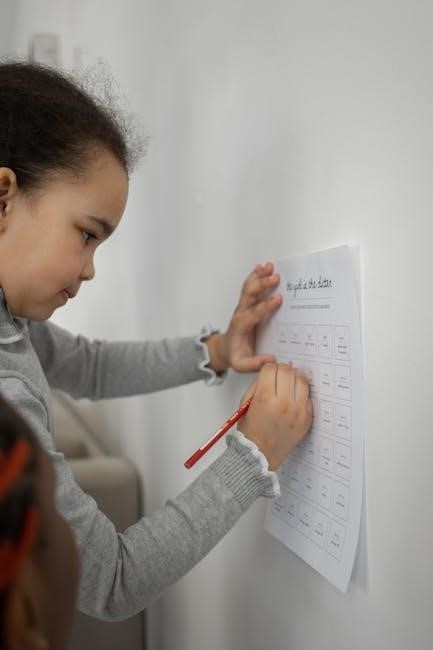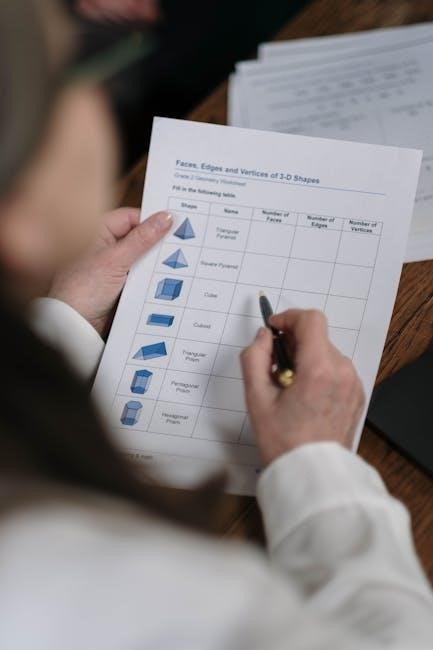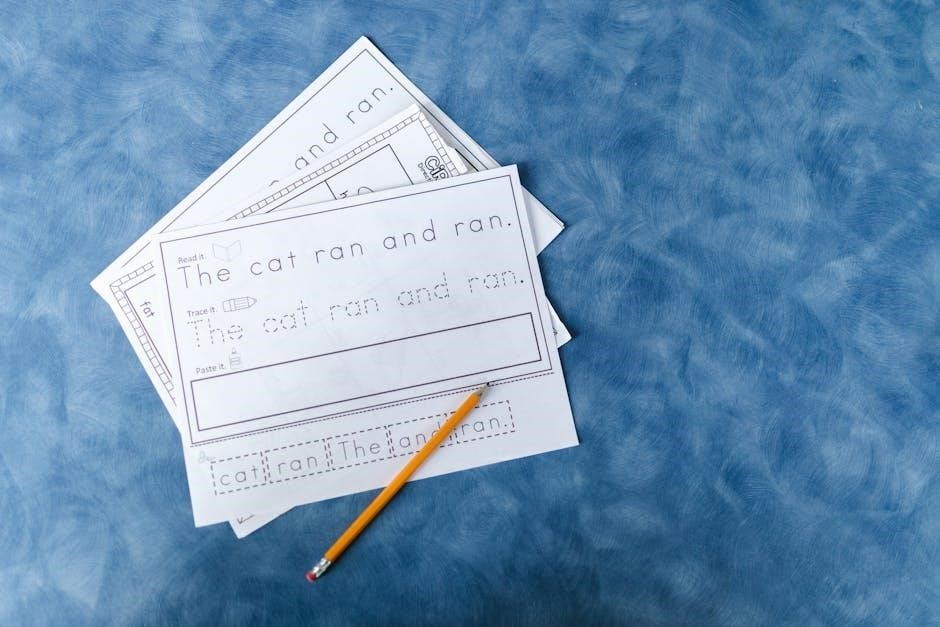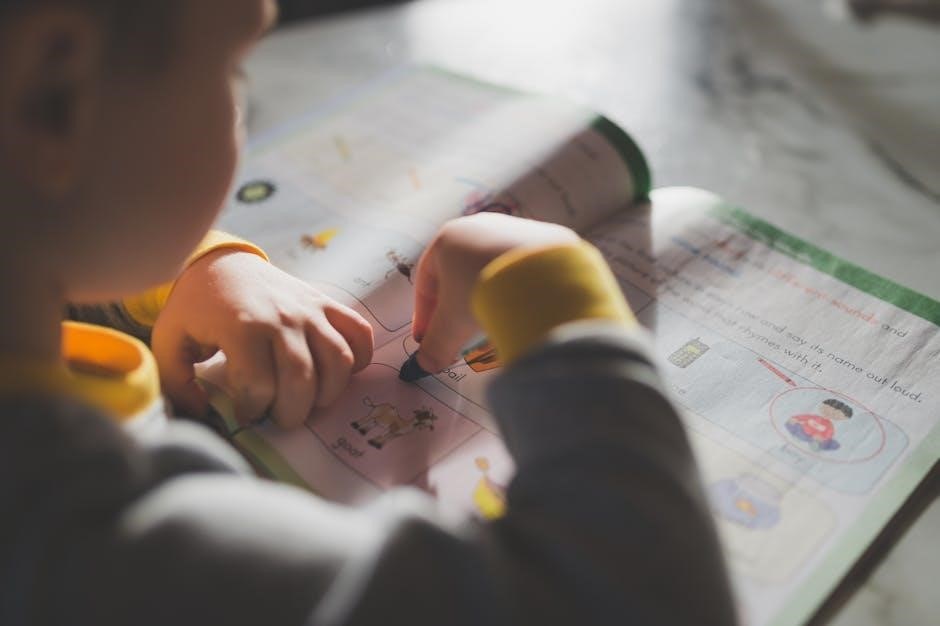
pia mellody worksheets pdf
Pia Mellody is a renowned author and expert in codependency recovery. Her worksheets, available as downloadable PDFs, guide individuals through self-reflection and healing processes, aiding in personal growth and trauma resolution.
1.1. Overview of Pia Mellody’s Work
Pia Mellody is a prominent figure in the field of codependency recovery, known for her groundbreaking work in understanding and addressing relational trauma. Her writings, including Facing Codependence and The Intimacy Factor, provide foundational insights into boundary systems, self-esteem issues, and emotional manipulation. Mellody’s structured approach, supported by downloadable PDF worksheets, offers practical tools for self-reflection and healing, making her resources indispensable for individuals seeking personal growth and recovery from dysfunctional patterns.
1.2. Importance of Worksheets in Recovery
Pia Mellody’s worksheets are essential tools for recovery, offering structured exercises to identify and address codependency patterns. They provide practical steps for self-reflection, boundary setting, and emotional healing. Available as downloadable PDFs, these resources guide individuals in understanding trauma, improving self-esteem, and developing healthy relationships. Mellody’s worksheets are invaluable for both newcomers and those in long-term recovery, aiding in personal growth and transformative change.
Understanding Codependency Patterns
Codependency is a behavioral pattern marked by emotional dependence and dysfunctional relationships. It often stems from childhood trauma, affecting personal and relational well-being. Pia Mellody’s worksheets provide insights into identifying and addressing these patterns through structured exercises, helping individuals recognize core symptoms like fear of abandonment and poor boundary setting.
2.1. Definition and Core Symptoms of Codependency
Codependency is a dysfunctional relational pattern rooted in emotional dependence and fear of abandonment. Core symptoms include difficulty with self-esteem, immaturity, and poor boundary setting. Pia Mellody identifies five core issues: self-esteem, boundaries, reality testing, emotional management, and intimacy. Her worksheets help individuals recognize these patterns, providing tools for self-assessment and growth. By addressing these symptoms, individuals can begin to break free from codependent cycles and develop healthier relationships.
2.2. Patterns and Characteristics of Codependence
Codependence often manifests as excessive caretaking, people-pleasing, and fear of abandonment. Patterns include poor boundary setting, emotional manipulation, and enabling behaviors. Pia Mellody’s checklist highlights traits like difficulty expressing emotions and a tendency to prioritize others’ needs over one’s own. These characteristics stem from childhood relational trauma, leading to immaturity and intimacy challenges. Recognizing these patterns is crucial for recovery, as outlined in her worksheets.
2.3. Self-Evaluation Checklist for Codependency
Pia Mellody’s checklist helps identify codependent traits like low self-esteem, fear of abandonment, and enabling behaviors. It assesses patterns such as boundary issues, emotional manipulation, and difficulty expressing feelings. This tool aids newcomers in understanding codependency and seasoned individuals in pinpointing areas for growth. By reflecting on these traits, individuals can begin transforming unhealthy patterns rooted in childhood trauma, fostering personal and relational healing.

Boundary Systems in Relationships
Pia Mellody describes boundaries as symbolic fences protecting one’s reality during intimacy. They serve to contain and protect, ensuring identity and respect in relationships, fostering healthy connections through clear limits.
3.1. Pia Mellody’s Concept of Boundaries
Pia Mellody defines boundaries as symbolic, invisible fences that protect a person’s reality and identity during intimacy. They serve three purposes: to prevent being a victim, to avoid offending others, and to establish a clear sense of self. These boundaries are essential for healthy relationships, as they promote respect, containment, and protection of one’s emotional and psychological well-being. Mellody’s worksheets help individuals identify and implement these boundaries effectively.
3.2. Purposes of Boundaries in Intimacy
Boundaries in intimacy, as outlined by Pia Mellody, serve to protect a person’s identity and reality. They ensure emotional safety, prevent enmeshment, and maintain healthy separation. By setting these limits, individuals can express their needs clearly and respect those of their partner, fostering mutual respect and understanding. Mellody’s worksheets provide practical exercises to establish and communicate these boundaries effectively, enhancing intimacy and connection in relationships.
3.3. Setting Healthy Boundaries
Setting healthy boundaries involves clear communication and mutual respect. Pia Mellody’s worksheets guide individuals to identify and express their limits effectively. This process includes understanding personal needs, practicing assertiveness, and establishing consequences for boundary violations. By implementing these strategies, individuals can protect their emotional well-being and foster balanced, intimate relationships, as outlined in Mellody’s resources and PDF materials.

Trauma Assessment and Worksheets
Pia Mellody’s trauma assessment tools help individuals document childhood relational trauma, linking it to codependency. Her worksheets guide users through reflection and healing, available as downloadable PDFs.
4.1. History of Childhood Relational Trauma Worksheet
Pia Mellody’s History of Childhood Relational Trauma Worksheet guides individuals in documenting traumatic experiences from birth to age 17. It includes sections for detailing the type of trauma, perpetrators, incidents, and emotions felt during and after the events. This tool helps users identify patterns linking childhood trauma to adult codependency. Available as a downloadable PDF, it encourages reflection and healing by systematically recording and understanding past wounds.
4.2. Instructions for Trauma Description Worksheet
Pia Mellody’s Trauma Description Worksheet provides a structured format for detailing childhood relational trauma. Users are guided to list traumatic incidents, emotions felt during and after events, and reflections on their impact. Instructions emphasize recording experiences from birth to age 17, ensuring clarity and depth. This step-by-step approach helps individuals process trauma systematically, fostering insight and healing. The worksheet is available as a downloadable PDF, offering a practical tool for recovery work.
4.3. Link Between Trauma and Codependency
Childhood relational trauma significantly contributes to codependency, often resulting in emotional immaturity and unmanageability. Pia Mellody’s work highlights this connection, emphasizing the importance of addressing trauma to overcome codependent patterns. Her worksheets provide structured tools for identifying and processing these experiences, fostering recovery and personal growth. This link is essential for understanding and healing from codependency, as unresolved trauma can perpetuate dysfunctional relationship dynamics.

Family of Origin Questionnaire
Pia Mellody’s Family of Origin Questionnaire helps identify major caregivers, birth order, and sibling dynamics, offering insights into how childhood experiences shape codependency patterns and emotional struggles.
5.1. Identifying Major Caregivers
Pia Mellody’s Family of Origin Questionnaire guides individuals in identifying major caregivers, such as parents or guardians, and their roles during childhood. It prompts users to list names, relationships, and brief descriptions of each caregiver, including their influence and behavior. This exercise helps individuals recognize patterns of care and control, shedding light on how early relationships shaped their self-esteem, boundaries, and emotional responses, aiding in recovery from codependency and trauma.
5.2. Birth Order and Sibling Relationships
Pia Mellody’s worksheets explore birth order and sibling dynamics, prompting users to list siblings, their roles, and relationships. This reflection helps identify how early family hierarchies and interactions influenced self-esteem, responsibility, and conflict resolution skills. Understanding these patterns reveals how they may contribute to codependent behaviors, aiding individuals in breaking free from dysfunctional relational cycles and fostering healthier connections in adulthood through self-awareness and growth.
5.3. Impact of Family Dynamics on Codependency
Pia Mellody’s worksheets highlight how dysfunctional family dynamics, such as abuse, neglect, or inconsistent caregiving, shape codependent behaviors. These early experiences often lead to issues like low self-esteem, immaturity, and difficulty with intimacy. By examining these patterns, individuals can trace how their upbringing influences current relationships, empowering them to address and transform these deeply rooted challenges through awareness and healing exercises tailored in her materials.
Intimacy and Relationship Issues
Pia Mellody’s worksheets address challenges in intimacy, emotional manipulation, and control patterns, offering tools to transform dysfunctional relationship dynamics into healthy, balanced connections through self-awareness and practical exercises.
6.1. Challenges in Intimate Relationships
Challenges in intimate relationships often stem from unresolved trauma, emotional manipulation, and unhealthy communication patterns. Pia Mellody’s worksheets help individuals identify these issues, emphasizing the importance of boundaries and self-awareness. By addressing core wounds and fostering accountability, her exercises empower individuals to break free from dysfunctional cycles, promoting healthier and more authentic connections in their relationships. This process encourages personal growth and intimacy built on mutual respect and understanding.
6.2. The Intimacy Factor by Pia Mellody
In “The Intimacy Factor,” Pia Mellody explores how trauma and codependency impact relationships, offering practical strategies for healing. Her worksheets guide individuals in identifying intimacy barriers and developing healthier connection patterns. By addressing core issues like self-esteem and emotional manipulation, Mellody’s work helps individuals achieve deeper, more authentic intimacy, fostering lasting change and emotional fulfillment in their relationships.
6.3. Breaking Free from Dysfunctional Patterns
Pia Mellody’s worksheets provide a step-by-step approach to identifying and breaking free from dysfunctional relationship patterns. By addressing core issues like emotional manipulation and trauma, individuals can develop self-awareness and healthier communication. Her tools guide users in transforming harmful behaviors into constructive ones, fostering personal growth and more fulfilling relationships. Mellody’s methods empower individuals to heal and establish boundaries, leading to lasting change and emotional freedom.
Self-Esteem and Core Issues
Pia Mellody’s worksheets address self-esteem struggles and core issues stemming from trauma, helping users identify and transform these patterns for healing and personal growth effectively.
7.1. Difficulty with Self-Esteem
Pia Mellody identifies low self-esteem as a core issue in codependency, often rooted in childhood trauma. Her worksheets help individuals recognize negative self-perceptions and patterns. By addressing these, users can transform their self-image, fostering emotional healing. This process is crucial for rebuilding a healthy sense of identity and improving intimacy in relationships. Mellody’s approach provides practical steps toward lasting self-esteem recovery and personal growth.
7.2. Core Issues in Codependency
Pia Mellody identifies core issues in codependency as immaturity, unmanageability, and intimacy problems, stemming from childhood relational trauma. Her worksheets help individuals connect these issues to early experiences, fostering self-awareness. By addressing these core patterns, users can break free from dysfunctional cycles and develop healthier relationships. Mellody’s approach emphasizes understanding and transforming these deep-seated challenges to achieve emotional balance and recovery.
7.3. Building Healthy Self-Esteem
Building healthy self-esteem is a cornerstone of recovery, as emphasized in Pia Mellody’s worksheets. Her approach focuses on identifying and challenging negative self-perceptions rooted in childhood trauma. Through journaling and self-reflection exercises, individuals learn to reframe their self-worth, fostering a more compassionate and realistic self-image. Mellody’s tools guide users to establish boundaries, practice self-care, and cultivate self-acceptance, ultimately replacing shame with confidence and resilience.
Emotional Manipulation and Control
Pia Mellody’s worksheets address emotional manipulation and control as rooted in unresolved trauma and codependency. Her tools help individuals recognize these patterns, offering strategies to break free and foster healthier communication and mutual respect in relationships.
8.1. Recognizing Emotional Manipulation
Pia Mellody’s worksheets help individuals identify emotional manipulation by exploring patterns rooted in trauma and codependency. Her exercises guide users to recognize how manipulative behaviors, such as guilt-tripping or control, impact relationships. By assessing personal experiences, individuals can pinpoint manipulative tendencies and understand their origins, fostering awareness and accountability. Mellody’s tools emphasize the link between unresolved trauma and manipulative behaviors, offering a pathway to healthier communication and emotional freedom. This section provides practical strategies for breaking these harmful cycles.
8.2. Breaking Free from Control Patterns
Pia Mellody’s worksheets offer practical tools to break free from control patterns rooted in trauma and codependency. Her exercises help individuals identify and challenge manipulative behaviors, fostering healthier communication. By setting boundaries and practicing assertiveness, individuals can reclaim their emotional autonomy. Mellody’s methods emphasize self-awareness and accountability, guiding users toward liberating themselves from harmful control dynamics and fostering balanced, respectful relationships. This process promotes emotional freedom and personal growth.
8.3. Healthy Communication in Relationships
Pia Mellody emphasizes the importance of healthy communication in relationships through her worksheets. She advocates for active listening, clear expression of needs, and empathy to foster understanding. Mellody’s exercises help individuals move away from manipulative or passive behaviors, encouraging open and honest dialogue. By practicing these skills, individuals can build trust and intimacy, creating a foundation for healthier, more balanced relationships. Her approach promotes emotional authenticity and mutual respect.
Assertiveness and Boundary Setting
Pia Mellody’s worksheets guide individuals in practicing assertive communication and setting healthy boundaries, fostering self-respect and balanced interactions in relationships.
9.1. Assertiveness as a Tool for Recovery
Pia Mellody emphasizes assertiveness as a key tool for recovery, enabling individuals to express needs clearly without aggression or passivity. Her worksheets provide structured exercises to enhance self-confidence and communication skills, aiding in the development of healthy boundaries. By practicing assertiveness, individuals can transform dysfunctional relationship patterns, fostering personal growth and emotional well-being. Mellody’s approach encourages self-respect and mutual respect in all interactions, promoting lasting change.
9.2. Practicing Assertive Communication
Pia Mellody’s worksheets guide individuals in practicing assertive communication, emphasizing clear expression of needs and feelings. Techniques include active listening, using “I” statements, and maintaining respectful dialogue. These exercises help individuals set boundaries while fostering mutual respect. Mellody’s approach encourages balancing self-respect with empathy, transforming interactions into constructive exchanges. By mastering assertive communication, individuals can navigate relationships more effectively, promoting personal growth and healthier connections.
9.3. Respecting Personal Boundaries
Pia Mellody emphasizes the importance of respecting personal boundaries as a foundation for healthy relationships. Her worksheets provide practical tools to identify and communicate limits effectively. By practicing boundary-setting, individuals can protect their emotional and psychological well-being while fostering mutual respect. Mellody’s approach helps individuals move away from codependency by empowering them to assert their needs without compromising others’ rights, promoting balanced and fulfilling connections.

Case Studies and Real-Life Applications
This section explores real-life examples of individuals who used Pia Mellody’s worksheets to overcome trauma and codependency, highlighting practical applications and successful recovery stories.
10.1. Successful Recovery Stories
Many individuals have shared inspiring stories of transformation using Pia Mellody’s worksheets. These stories highlight how her structured exercises helped them identify patterns of codependency and trauma, leading to profound emotional healing.
By applying the worksheets, people have reported improved self-esteem, healthier relationships, and a stronger sense of personal boundaries. These real-life examples demonstrate the practical and life-changing impact of Mellody’s work in recovery journeys.
10.2. Overcoming Trauma and Codependency
Pia Mellody’s worksheets provide a structured path for healing from trauma and codependency. By exploring childhood experiences and boundary systems, individuals can address core issues like self-esteem and emotional manipulation. The exercises guide users to recognize patterns and break free from dysfunctional cycles, fostering empowerment and personal growth through introspection and practical application.
10.3. Practical Application of Worksheets
Pia Mellody’s worksheets offer practical tools for recovery, guiding users through exercises like identifying major caregivers and assessing childhood trauma. These exercises promote self-reflection and healing, helping individuals break free from codependency patterns. The structured format allows for personal insight and growth, making the worksheets invaluable for real-life application in overcoming trauma and fostering healthier relationships. Regular use enhances self-awareness and empowers individuals to address core issues effectively.

Additional Resources and Worksheets
Pia Mellody’s worksheets are complemented by her books, such as Facing Codependence and The Intimacy Factor. Additional resources include downloadable PDFs, online tools, and guided exercises for recovery.
11.1. Recommended Reading and Summaries
Pia Mellody’s works, such as Facing Codependence and The Intimacy Factor, are essential for understanding codependency and trauma. Free PDF summaries of her books are available online, offering concise insights into her teachings. Additionally, her Breaking Free Workbook provides practical exercises for recovery. These resources, along with downloadable worksheets, help individuals deepen their understanding and apply her methods effectively in their personal growth journey.
11.2. Downloadable PDF Worksheets
Pia Mellody’s worksheets, such as the Family of Origin Questionnaire and Trauma Description Worksheet, are widely available in PDF format. These tools guide users through self-assessment and reflection, aiding in identifying codependency patterns and childhood trauma. Downloadable from various online sources, they complement her books, offering practical exercises for personal growth and recovery. These resources are invaluable for individuals seeking structured approaches to healing and understanding their emotional struggles.
11.3. Online Tools for Recovery
Enhance recovery with online tools designed to complement Pia Mellody’s PDF worksheets. Interactive platforms offer guided exercises, progress tracking, and community support, helping users apply Mellody’s teachings effectively. These tools provide accessible resources for self-reflection and healing, making recovery more manageable and engaging in today’s digital age.
Pia Mellody’s worksheets offer transformative tools for recovery, empowering individuals to heal from codependency and trauma. Her work provides a clear path toward self-awareness and growth.
12.1. The Impact of Pia Mellody’s Work
Pia Mellody’s work has profoundly influenced the field of codependency recovery. Her worksheets and writings provide practical tools for healing, empowering individuals to establish healthy boundaries and improve self-esteem. By addressing trauma and intimacy issues, Mellody’s resources have become essential for therapists and individuals seeking lasting transformation and emotional freedom.
12.2. Final Thoughts on Recovery
Recovery from codependency and trauma is a transformative journey. Pia Mellody’s worksheets offer a structured path for self-discovery and growth. By addressing core issues like self-esteem and boundaries, individuals can break free from dysfunctional patterns. Embracing these tools fosters resilience and intimacy, leading to a fulfilling life. Mellody’s approach emphasizes empowerment, guiding individuals toward sustainable healing and emotional freedom.
12.3. Encouragement for Continued Growth
Embracing Pia Mellody’s worksheets is a powerful step toward lasting change. Recovery is a journey, not a destination, and consistent effort fosters resilience. Celebrate small victories and remain compassionate with yourself. Surround yourself with supportive communities and resources, like Mellody’s PDF guides, to deepen your healing. Growth is lifelong, and every step forward is a testament to your strength and commitment to a healthier, more authentic life.